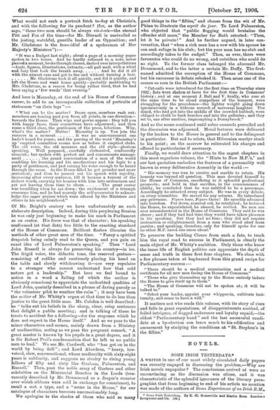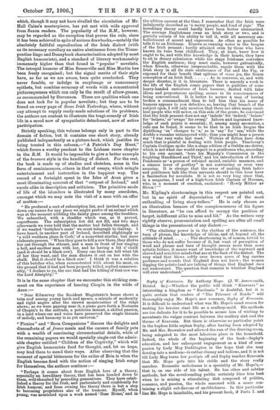NOVELS.
SOME IRISH YESTERDAYS.*
A WRITER in one of our most widely circulated daily papers was recently engaged in discussing the problem,—Why are Irish novels unpopular ? The conclusions arrived at were as unconvincing as the discussion was otiose, and it was characteristic of the splendid ignorance of the literary para. graphist that from beginning to end of his article no mention was made of the authors of Some Experiences of an Irish B.M., * Some Irish Yesterdays. By E. 4E. Somerville and Martin Boss. London Longmana and Co. [6a.]
which, though it may not have rivalled the circulation of Mr.
Hall Caine's masterpieces, has yet met with wide approval from Saxon readers. The popularity of the R.M., however,
may be regarded as the exception that proves the rule, since it has been achieved in spite of serious drawbacks,—notably the absolutely faithful reproduction of the Irish dialect (with as its necessary corollary an entire abstinence from the Trans- pontine lingo and Donnybook characterisation adopted by most English humourists), and a standard of literary workmanship immensely higher than that found in " popular " novelists.
The intrepid humour of Miss Somerville and Miss Martin has been freely recognised ; but the signal merits of their style
have, so far as we are aware, been quite overlooked. They never fumble, or indulge in surplusage or unnecessary epithets, but combine economy of words with a concentrated picturesqueness which can only be the result of elbow-grease,
as recommended by Stevenson. These are qualities which one does not look for in popular novelists ; but they are to be
found on every page of Some Irish Yesterdays, where, without
any attempt to supply ready-made solutions of its problems, the authors are content to illustrate the tragi-comedy of Irish life in a mood now of sympathetic detachment, now of active participation.
Strictly speaking, this volume belongs only in part to the domain of fiction, but it contains one short story, already published independently as a picture-book, which justifies its being treated in this column,—" A Patrick's Day Hunt,"
which forms a worthy pendant to the Lishane races chapter in the R.M. It would be impossible to give a better example of the bravura style in the handling of dialect. For the rest, the book is made up of studies and sketches, some in the form of reminiscences, others in that of essays, which mingle
entertainment and instruction in the happiest way. The record of a fortnight spent in the Isles of Aran gives a most illuminating account of that " outpost of Ireland," and excels alike in description and criticism. The primitive mode of life of the islanders is illustrated by many anecdotes, amongst which we may note the visit of a man with an offer of mutton:—
" He produced a sort of subscription list, and invited us to put down our names for any piece we might prefer of an animal which was at the moment nibbling the dainty grass among the boulders. We subscribed, with a shudder which was, as it proved, superfluous. The subscription list did not fill, and two days afterwards we were told that the matter had fallen through, and if we wanted • buttcher's mate' we must telegraph to Galway. I have heard, in another part of Ireland, described slightingly as a wild westhern place in Cork,' of a somewhat similar, but more elaborate process. When they goes to kill a cow there, they dhrive her out through the sthreet, and a man in front of her ringing a bell, and another man with her, and he having a bit o' chalk (and it should be a black cow). Every one then can tell what bit of her they want, and the man dhraws it out on her with the chalk. But it should be a black cow.' I think it was a relative of this butcher who, when remonstrated with about his meat, on the ground that it had not been properly killed, replied unanswer- ably, I declare to ye, the one that had the killing of that cow was the Lord Almighty."
It is in the same chapter that we encounter this striking com- ment on the experience of hearing Chopin in the wilds of Aran
" Near Bilmnrvey the Resident Magistrate's house shows a trim roof among young larch and spruce, a miracle of modernity and right angles after the strewn monstrosities of the ridge above; as we were passing near it, a piano gave forth a Nocturne of Chopin's to the solitude, a patrician lament, a skilled passion, in a land where ear and voice have preserved the single threads of melody, and harmony is as yet unwoven."
" Picnics" and " Boon Companions " discuss the delights and
discomforts of al fresco meals and the careers of family pets with a wealth of convincing circumstantial details, while of
the remaining papers we would specially single out the admir- able chapter entitled " Children of the Captivity," which will give English humonrists food for thought, and, let us hope, may lead them to mend their ways. After observing that the
moment of special bitterness for the exiles of Erin is when the English become fired with the notion of singing Irish songs for themselves, the authors continue :— " Perhaps it comes about from English love of a theory, especially an hereditary theory, that has been handed down to them, well-thumbed by preceding generations. They have estab- lished a theory for the Irish, and particularly and confidently for Irish humour, and from owning the theory there is but a step to becoming proprietors also of the humour. Myself, when young, was nourished upon a work named 'Near Home,' and in
the edition current at the time, I remember that the Irish were indulgently described as 'a merry people, and fond of pigs.' The
hereditary theory could hardly have been better summarised. The average Englishman owns an Irish story or two, and is genially certain of his ability to tell it, with all neoessary em- bellishment of accent and expression. As often as possible he tells it to an Irishman. Elusive as running water is the brogue of the Irish peasant ; hardly attained even by those who have known its tune from childhood. They, at least, know how it ought to be, and with this knowledge in their hearts, they have to sit in dreary submission while the stage Irishman convulses the English audience ; they must smile, however galvanically, when friends, otherwise irreproachable, regale them with the Irish story in all its stale exuberance of Pat and the Pig, or expound for their benefit that epitome of vieux jeu, the Saxon conception of an Irish Bull As in converse, so, and with
deeper disaster, is it in literature There is scarcely a week in
the life of the English comic papers that is guiltless of some heavy-handed caricature of Irish humour, daubed with false idiom and preposterous spelling, secure in its consciousness of being conventional. It is better to accuse a man of having broken a commandment than to tell him that his sense of humour appears to you defective, so, leaving that branch of the subject open, I will only mention that there are alive many excel- lent people who will never, on this side of the grave, bo convinced that the Irish peasant does not say indade ' for ' indeed," belavo' for believe,' or 'swaps' for sweep.' Inborn and ingrained know- ledge of such points is essential; if, among many anomalies, a rule can be found, it seems to be that in an Irish brogue the diphthong ea' changes to a,' as in say' for sea,' while the double e remains untampered with ; thus you might hear a person say I was very wake last week.' Writers of fiction have done much that is painful in dealing with Irish people. Thackeray's Captain Costigan spoke like a stage edition of a Dublin car-driver, which is not what one would expect in a gentleman who, according to his own account, bore his Majesty's Commission in the foighting Hundtherd and Third,' and his introduction of Arthur Pendennis as a person of refoined moind, emiable manners, and a sinsare lover of poethry' is not convincing or even very amusing. It is strange that the error of making Irish ladies and gentlemen talk like their servants should to this hour have a fascination for novelists. It is not so very long since that, in a magazine, I read of a high-born Irish Captain of Hussars, who, in a moment of emotion, exclaimed : Howly Blither av Riven ! ' " Mr. Kipling's shortcomings in this respect are pointed out, but in no spirit of depreciation of " one of the most enthralling of living story-tellers." He is only chosen as an illustration because of the conspicuousness of his figure in literature, as " he can afford to occupy the position of target, indifferent alike to miss and hit." As the writers very rightly observe, pronunciation and spelling are after all small things in the presentment of any dialect :—
" The vitalising power is in the rhythm of the sentence, tho turn of phrase, the knowledge of idiom, and of, beyond all, the attitude of mind The shortcoming is, of course, trivial to those who do not suffer because of it, but want of perception of word and phrase and turn of thought means more than mere artistic failure, it means want of knowledge of the wayward and shrewd and sensitive minds that are at the back of the dialect. The very wind that blows softly over brown acres of bog carries perfumes and sounds that England does not know : the women digging the potato-land are talking of things that England does not understand. The question that remains is whether England will ever understand."















































 Previous page
Previous page